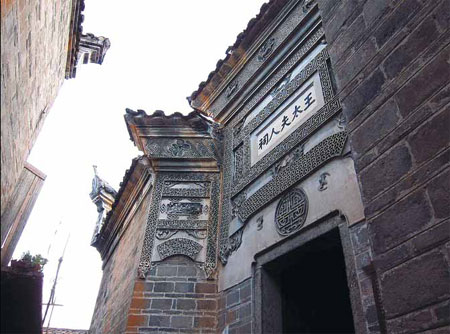

Bailu village has more than 60 ancestral temples of gray tiles and white walls, believed to bring good qi, or energy, from heaven. Photos Provided to China Daily
When you are in Ganzhou city, you eat, breathe and sleep the intricacies of feng shui, as Sun Ye finds out.
It's mystic, according to believers. That feng shui thing. For example, the direction of the mansion door of a house could influence the life of a family. It could drain a family's entire fortune or guarantee high-ranking bureaucracy jobs for generations to come. In Bailu village, or the village of egrets near Ganzhou, Jiangxi province, villagers opt to err on the side of caution.
The village of Huizhou-style architecture, narrow brick alleys and quiet corners, looks like a scene from a landscape painting. It sits at the foot of five sprawling mountain ridges and faces a stream coming down from the east.
Its first settler, a middle-aged Hakka by the name of Zhong Yu, found the scenic place about 900 years ago. It is said that he had a dream of droves of egrets soaring into the clouds and leading him to wild nests of eggs. His dream came true and that's why he named the village after the auspicious birds. He also started his adventure of exploring the village of good omens.
Following his investigations, he concluded that the position of the mountains in the village welcomed Chinese dragons and the flowing waters bring wealth.
The village grew, all the while adhering to the principles of feng shui, directly translated as "wind and water".
Doors are built aligned with the direction of the stream. Houses are erected to face the valleys of the mountains for an "unblocked fortune". Bats that invite happiness, cranes that ensure longevity, carps that promise high official ranks are engraved on gables, walls and stone blocks.
Now the village has more than 60 ancestral temples of gray tiles and white walls, believed to bring good qi, or energy, from heaven.
Every generation of the Zhong family has been blessed with good fortune, widely attributed to their qi management.
One descendant was so well-off that when he dispensed his fortunes among his sons in his twilight years, some 20 patios were filled with bars of silver and gold.
Mansions aside, the village is a picturesque and friendly hideout with clear water and balmy breezes.
One of the attractions of the village is the Zhong family temple, a high-ceilinged and grand worship sanctuary.
There, you will be greeted with bowls of homemade rice wine - sweet, cool and strong. Or bowls of tea that taste salty, warm and soothing. The tea is a mixture of ground peanuts, vegetables and sesame.
While sipping the wine or tea, you will most likely witness six to 12 men stripped to the waist circling a bucket of steaming millet, thumping at it with wooden clubs while chanting.
Concepts from feng shui geomancy and mythic elements of daoism are usually present in the construction and layout of Chinese architecture.
Perching their beloved bird cages on the weatherworn bricks of the centuries-old city wall, a group of senior citizens gather in the open to bask in the early morning sun.
Copyright ©1999-2018
Chinanews.com. All rights reserved.
Reproduction in whole or in part without permission is prohibited.